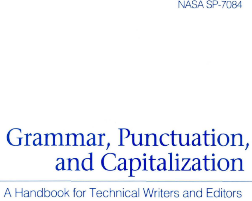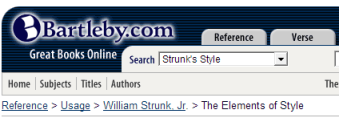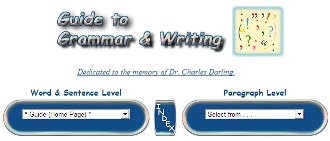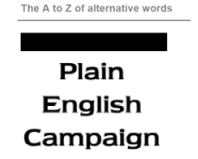Business Writing Resources
Use Dictionaries for Writing Business Correspondence
Dixie is sure you agree with her that when you're writing a piece of business correspondence a dictionary or thesaurus (or even better, both) could be very handy. The Internet (with Dixie's help, of course) allows you to have them in one place. So, the first business writing resource Dixie highly recommends is the amazing dictionary lookup form below that incorporates a lot of dictionaries, thesauruses and encyclopedias.
Don't you just love this form?! Can you imagine how many volumes this resource would have if it were a book? This could very well be the only reference form for checking words you would ever need.
Another Great Encyclopedia-Like Resource
But still, Dixie would like you to have access to as many great resources as possible. Click on the picture to the left to go to the site which has been providing authoritative answers to all kinds of factual questions on the web since 1998, and long before that on the radio. You can use Infoplease as an online reference or as a research tool.A Newer Kind of Dictionary
Dixie suggests you check out one more dictionary, for lack of a better word. Actually, it is a word spy site which is devoted to new terms that have appeared multiple times in newspapers, magazines, books, Web sites, and other recorded sources. Dixie thinks you wouldn't mind including some of these latest neologisms in your business correspondence. Though she would like to warn you to be very careful as not all of these new words can be used in business writing and there are a few among them you might not want to use ever. But Dixie knows she can rely on your common sense in choosing the appropriate words!
Great Writing Guides
Dixie loves letters and other pieces of business correspondence written in plain, clear and concise English and she shared with you her views on this subject on the page about business writing. Dixie understands that some of you may be used to writing business correspondence the old way and if you want to shift to plain language it might be helpful for you to check out the business writing resources she would like to offer you.Dixie is committed to bringing you the crème de la crème resources that can help you write really good business correspondence. She hopes you excuse her French, especially on the web page stressing the necessity of using plain English but Dixie is so excited she can provide you with the links to some really wonderful writing reference materials and the French phrase reflects her mood very well! Some of the writing guides may seem similar at a glance but each of them has some features that are not addressed by others and each of them is really great.
Garbl's Style Manual
One of the business writing resources Dixie finds indispensable is a Style Manual from Garble's Writing Center which contains heaps of valuable information about abbreviations, addresses, capitalization, terminology, numbers, plurals, possessives, punctuation, spelling and word usage. This guide focuses on the U.S. standards for definitions, language use, style and grammar. Dixie thinks this manual is perfect as a reference book for writing business correspondence, or anything else for that matter. This site has been taken off the Internet in the fall of 2015, but it can still be found in the internet archive which will open when you click on the image above.
NASA Special Publication: Grammar, Punctuation, and Capitalization: a Handbook for Technical Writers and Editors
This guide which Dixie also loves is called Grammar, Punctuation, and Capitalization: a Handbook for Technical Writers and Editors, it is in a PDF format. It was written by a technical editor with 15 years experience. The Handbook addresses writing problems which are often encountered in technical documents. It is also very useful for those of you who have to review others' writing. Its major purpose is to present functional grammar and punctuation rules. Besides, its author recognizes that authorities differ on many rules of grammar, punctuation, and capitalization; these rules are constantly changing (as is our whole language); and these rules (when they can be definitely ascertained) sometimes should be broken! Dixie loves this last point and she is sure you're not surprised to hear that. And guess what, this guide is still being used by NASA Langley Research Center which it has been originally developed for. Dixie is happy she can offer you a link to such a valuable resource.The Elements of Style
The next resource that Dixie is very excited about is one of the most influential books on writing ever written, a classic reference book called The Elements of Style by William Strunk, Jr. which is now freely available online. It focuses on a few essentials, the elementary rules of usage and principles of composition most commonly violated. It covers grammar, diction, syntax, sentence construction and other basic writing essentials.
Federal Plain Language Guidelines
Another writing resource Dixie finds quite useful is Federal Plain Language Guidelines. It was developed to improve the US government's communication with the citizens by the Plain Language Action and Information Network (PLAIN), which is a community of federal employees dedicated to the idea that citizens deserve clear communications from government. This guide's main focus is writing documents, and most of its priciples apply to writing business correspondence.
How to Write Clearly
Dixie also likes the European Commission's How to Write Clearly guide in a PDF format which is also affectionately called Fight the Fog. This booklet is intended for all writers of English, it sets out ten top tips for clear writing and contains "some hints - not rules - that will help you to write clearly and make sure your message ends up in your readers' brains, not in their bins". Some of us take it for granted that our business correspondence will end up in our readers' brains. Well, Dixie sure hopes it always does! And stays there, too. To produce the guide, the European Commission drew on the work of experts in plain language movements worldwide, and the campaign encouraged national contributions.
Business Writing Blog
Another great business writing resource in Dixie's opinion is a popular Business Writing Blog, formerly called "Talk, tips and best picks for writers on the job" that has innumerable resources for working professionals. It's a go-to site for those whose jobs involve any sort of writing. And it has a lot of tips on writing business correspondence, especially email.
Guide to Grammar and Writing
The Guide to Grammar and Writing was developed in 1996 by Dr. Charles Darling at the Capital Community College. It is a huge site devoted to grammar and writing, and Dixie does mean HUGE. It provides information on the following levels of grammar: sentence, paragraph and essay. It includes pages with samples of business correspondence, interactive quizzes, plague words and phrases to avoid and even a list of something called Anomalous Anonymies or simply put, goofs which are so hilarious Dixie and I had to stop reading them before we reached the end of the page... we were laughing so hard it hurt. Explore this resource in depth, it is incredibly good (especially its "Grammar" part, which almost everybody usually considers boring, so it might even change your mind about grammar).
Proofreading and Editing
Dixie would like to remind you that after you have written your perfect business correspondence piece it is usually quite useful to proofread it to make sure it is as perfect as you have thought. For that purpose she has decided to include a proofreading manual (a PDF download) in the resources she offers to your attention on this page. Besides, this manual includes proofreading and editing symbols that can be very handy.
A Few Useful Lists
Beside the above mentioned writing resources Dixie thinks it is very important to have a list of plain words and phrases that can be very helpful in keeping your writing short and simple.
So, why don't you check out the following link where you can find plain language alternatives (a PDF download) to substitute complex, pompous and overused words you often see in official writing (which are also included for comparison). By the way, this list is provided by a UK website. As the authors say, "It will help if you want to get rid of words like notwithstanding, expeditiously and phrases like in the majority of instances and at this moment in time. And using everyday words is an important first step towards clearer writing". Some of those alternatives won't work in every situation, but that's how life is: there are no ready-made solutions for everything. Your own contribution is always required to decide what is appropriate for business correspondence and what is not.And the next link takes you to a more specific list that is not a business writing resource as such, but Dixie thinks at least some of you can find it useful as it contains forms of address for public officials, military personnel, nobility and religious officials, including even the British peerage.
Some Simple Punctuation Rules
Another resource Dixie would like to offer you is a site with some relatively simple advice about how to use punctuation. Just follow the link to see how to use punctuation properly with examples of punctuation done right and wrong for comparison.
Writing for Business Quizzes
Nothing helps improve your writing better than practice. Download these business writing quizzes (a pdf download) and see for yourself. Free business writing tests is another great practical resource.
Need Some Errors?
In Dixie's opinion, you do! Just think about it, having at your disposal a list of most common errors can do wonders in helping you to avoid them. Follow the link to this Common Errors in English site and see for yourself.
Do You Use Jargon in Business Writing?
It turns out that a lot of firms do. Read this short article with some samples of heinous assaults on the English language. It might help you realize if you do it and Dixie hopes, avoid it in the future.
All in all, the above resources can make your life - or rather those hours of your life that you devote to business writing - much easier.
Dixie has gathered here the links to some of the best resources available on the Net which she has been using herself; and she is sure that practically all these resources are indispensable if you want to write effective business correspondence.
It doesn't mean though that you have to use them all every time you write a letter, but having them handy when you are not sure what or how to write, or need to check something, makes all the difference in the world!


|
Email this page | Tweet | You should click one of these buttons to share |











